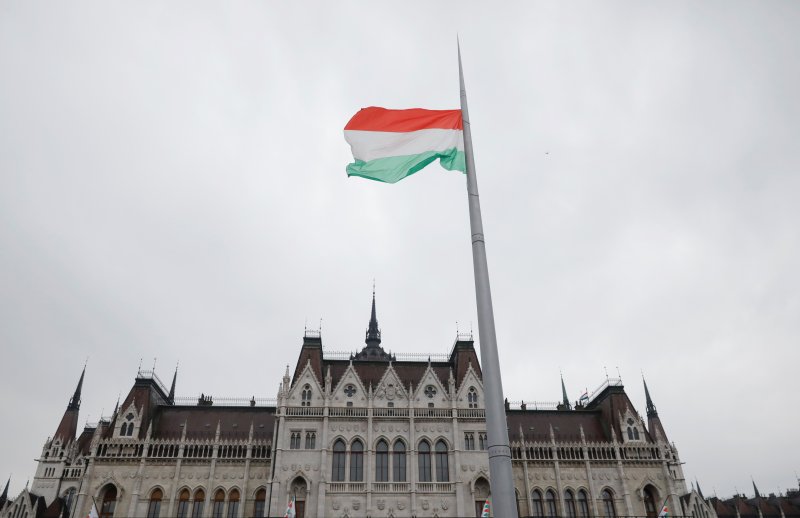
Hungarian political scientist Gábor Stier. Photo credit: index.hu
By Maria Zhigadlo
Hungary remains one of the few European Union countries openly critical of Brussels’ sanctions policy against Russia. Prime Minister Viktor Orbán has repeatedly stated that the restrictions imposed by the EU inflict significant economic damage not only on Moscow but also on Europe itself, undermining competitiveness and worsening the standard of living for citizens. Budapest continues to defend its position, emphasizing the need for dialogue and a peaceful resolution to the conflict.
What are the real economic consequences of sanctions for Hungary? Can Budapest block their extension within the EU? And how likely is it that other European countries will begin to question the effectiveness of the sanctions policy? In an interview with News.Az, Hungarian political scientist Gábor Stier, editor-in-chief of Moszkvater.com and a Valdai Club expert, discusses these issues.
– What is the actual economic damage caused by sanctions to Hungary, and which sectors have suffered the most?
– The Hungarian Prime Minister recently stated that due to the war, the country loses €6.5–7 billion annually. According to him, prices are rising as a result of sanctions, and after Ukraine halted gas supplies, Hungary’s access to energy resources has become even more expensive. He noted that a peaceful resolution to the conflict could immediately have a positive impact on the economy.
I would clarify that while the war and sanctions are just one of the causes of economic difficulties, there is no doubt that the current situation is affecting all of Europe. According to calculations by The Economist, if this crisis were resolved, Europe’s GDP could immediately grow by 0.5%. In Hungary, the impact of sanctions is primarily felt through rising energy prices, which in turn affect the overall economy and standard of living.
Additionally, sanctions have indirect consequences: strained relations between Hungary and Brussels complicate the unfreezing of European funds. Since the Hungarian economy is closely linked to the German economy, Germany’s economic downturn also has a severe impact on Hungary.
 A Hungarian national flag flutters outside the Hungarian parliament building in Budapest, Hungary. Photo: REUTERS/Marko Djurica
A Hungarian national flag flutters outside the Hungarian parliament building in Budapest, Hungary. Photo: REUTERS/Marko Djurica
– Can Budapest block the extension of EU sanctions, given its stance on the issue?
– From the very beginning, Hungary emphasized that the sanctions would not achieve their stated goal—they would not bring Russia to its knees but would weaken Europe’s competitiveness. However, despite its reservations, the Hungarian government has consistently voted for the extension of sanctions, adhering to the principles of realpolitik and EU unity.
The situation has changed dramatically with Donald Trump’s return to the political arena. He is determined to end the war as soon as possible and has already started negotiations with Moscow. This creates more room for maneuver for Hungary, which also advocates for a peaceful settlement. As a result, Washington’s pressure on Europe is increasing, and Budapest’s voice is growing louder.
At present, the Hungarian government is not only expressing its disapproval of the sanctions but is actively threatening to block their extension. Foreign Minister Péter Szijjártó stated that Hungary would not support extending the sanctions regime for Russians and Belarusians for another six months, arguing that time must be given for Russian-American negotiations. Thus, on Monday, Budapest will block the extension of sanctions, a decision that must be made before March 10.
– How likely is it that other EU countries will follow Hungary’s example and start questioning the sanctions policy against Russia?
– The leading EU countries are still sticking to their established course, but under U.S. pressure, their position is gradually softening. However, a fundamental reassessment of the sanctions policy would require a shift in public sentiment across Europe, which would inevitably influence the political elite.
Today, Hungary remains the only country openly opposing the sanctions, but behind the scenes, many share its stance. It is possible that as Trump’s actions unfold and his pressure on Brussels intensifies, countries such as Slovakia and Austria may also take a firmer position.
At the same time, the key factor remains U.S.-European relations. If negotiations between Washington and Moscow yield concrete results, this could accelerate a review of the EU’s sanctions policy. Otherwise, public opinion will play a decisive role, potentially pushing governments toward a change in course.